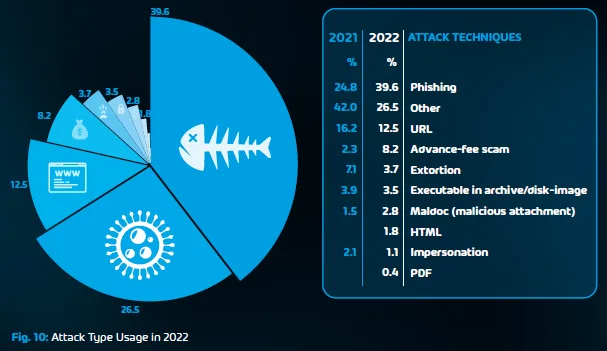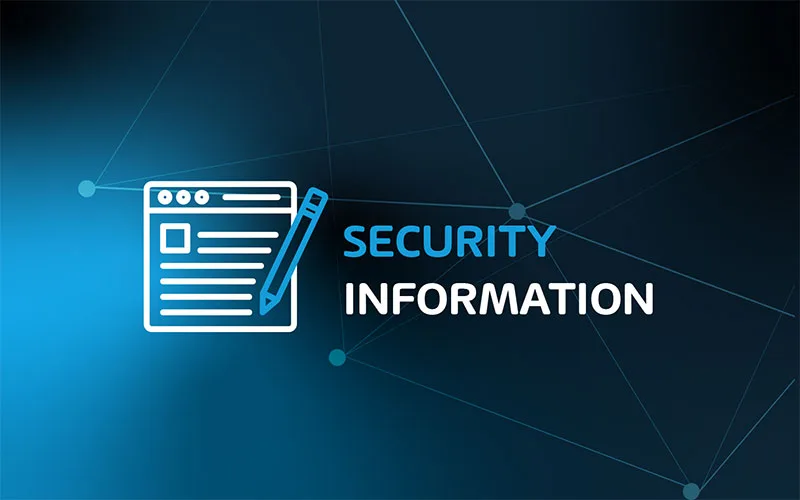

7 Reasons Why Security Awareness Is Critical for Employees
There was a time when security awareness training was informal, short, and focused on simple things like using complex passwords. Well, it transpires that keeping these on a post-it note under your keyword or in a text file is in fact not a safe practice.
This was when cyber threats from hackers were the work of people with expert skills, and at worst resulted in your computer getting infected with a virus, causing a brief interruption to your working day. Fast forward to the modern reality of the dark web where you can literally shop around and choose the method in which you want to carry out a targeted attack.
Added to that are the near-constant cyber-attacks, where we can see an increase in phishing in the below graph from the Cyber Security Report 2023.

Attackers are not slowing down and always finding new, harmful ways to compromise businesses. The efforts therefore to stay ahead and protect organizations must continue, and one of those is to introduce security awareness training. There is significant evidence that security awareness training is more than just essential. A recent Remote Management Survey by Hornetsecurity showed in fact that 1 in 3 organizations do not provide any kind of cybersecurity awareness training to remote employees.
A reliance solely on an organization’s security function for detection and prevention is no longer sufficient. Employees must be armed with security awareness training to become foot soldiers in this war, and I’ll explain the reasons why.
1. Protects Sensitive Data
Security awareness training helps employees understand the importance of protecting sensitive information and the consequences of a data breach. Protecting sensitive data helps to ensure cyber security and maintain the confidentiality, integrity, and availability of your information systems.
Using security awareness services, users are educated to understand how and why sensitive data needs to be protected and can help prevent unauthorized access and data breaches. This security awareness software in turn protects the organization’s reputation and financial well-being, as well as protects the personal information of customers and employees.
Sensitive data is essentially confidential information such as financial records and personally identifiable information (PII) and, depending on the nature of the organization, could also include trade secrets or proprietary information considered commercially sensitive.
Theft and subsequent compromise of sensitive data is very common and a highly prized target during security or data breaches. In IBM’s “Cost of a data breach report 2022” we can see the year-on-year cost of a data breach is going in the wrong direction!
Through a cyber security training program, users become aware of the legal and ethical obligations they have to safeguard it from unauthorized access, disclosure, or misuse. Arming your users with security awareness training provides the knowledge and skills necessary how to handle sensitive information and significantly reduces the risk of a data or security breach.
2. Fosters a Sustainable Security Culture
Creating and fostering a culture of security within the organization is a fundamental step in raising awareness of security threats and practices for mitigating them.
Regular security awareness training promotes a security culture within an organization, making security a priority for all employees. You might have heard the catchphrase “security is everyone’s responsibility.” There’s a lot of truth to that.
Through a security awareness training program, employees benefit by learning and becoming aware of the roles and responsibilities and shifting their mindset from “that’s someone else’s problem” to “that’s my problem.”
Providing security awareness training empowers them to take responsibility and notice and report anything out of the ordinary. This can extend from information security things like phishing scams and emails to physical security and being able to identify or report someone suspicious lurking in the office or tailgating when entering the premises!
A security-conscious workforce brings about a culture where users are more likely to take proactive steps to protect their sensitive data and report suspicious activity.
3. Detects and Prevents Insider Threats
Security awareness training can help identify and prevent potential insider threats, such as employees who may be intentionally or unintentionally compromising the security of an organization, and here is why cybersecurity awareness training is important.
Insider threats refer to security breaches that are caused by a person who has authorized access to an organization’s systems, network, and data. Although only employees are commonly considered, it includes anyone who has access to the organization’s systems like vendors or contractors.
Theft of sensitive information, sabotage of systems, using security credentials, and unauthorized access to confidential data are also examples of insider threats. These threats can significantly impact the organization like financial loss, reputational damage, and even legal liabilities.
4. Increases Employee Engagement
By educating employees on the importance of security threats within and towards it, organizations can increase employee engagement and buy-in to security initiatives.
Engaged employees are more likely to feel like they have a vested interest in the success of their organization, thereby creating a sense of loyalty and responsibility towards it. Ultimately resulting in overall better security practices and reducing the risk of security breaches.
Increased employee engagement through security awareness training can result in employee retention, an often overlooked benefit. When employees leave an organization, they often take away with them potentially institutional sensitive information especially if an employee has a role within the security function of that organization, as their departure could create a security gap and therefore a security risk.
Although most organizations have a defined security policy, in reality, the only time an employee reads this is when they initially join and are required to read this part of their onboarding as a compliance exercise. By being and feeling more engaged, you’re likely to see better compliance with and understanding of security policies and procedures.
Understanding why these policies are necessary and how they contribute to the organization’s overall security reduces the risk of accidental or intentional security breaches.

5. Education on Security Threats and How to Mitigate Them
Educating employees on security threats and how to mitigate them is crucial to maintaining a strong cybersecurity posture within an organization.
Employees who don’t work in a security-related role are often unaware of the plethora of security threats their organization faces every day. Incorporating education of security threats in a security awareness training program is an effective method to “enlist” employees as “soldiers” in this perpetual war.
Time is often of the essence when it comes to recognizing an IT security threat. For example, if a user who has not undergone a security awareness training program opens a malicious link, then realizes this, they are less likely to understand the significance of how quickly they must act on this information and report this.
Employees who understand the impact posed by security threats are more likely to make better decisions armed with this education.
6. Reduces Human Error
Employees are less likely to make costly security mistakes if they have received training on identifying and responding to security threats. Human error is a common cause of security incidents and one of the most common methods attackers use to infiltrate a network.
As you will have been, whenever there is a data breach, along with significant reputational damage, the financial cost is often significant. Assessing the cost and worth of implementing these security measures and awareness training is easily outweighed by the savings in not.
7. Supports Incident Response
Security awareness training equips employees with the knowledge and skills to respond effectively to security incidents, reducing the impact and recovery time of such incidents.
In an organization’s cyber security incident response plan, it will include and detail the roles and responsibilities for everyone in the organization. In the event of a security incident, it is important for all members of the organization to understand their roles and responsibilities in responding to the incident.
A security awareness program will help to educate people who are involved in being able to respond in the face of a security incident adequately and more quickly. Educated users are also more likely to recognize the signs of a security incident and report is prompt, which can help the incident response team take action more quickly.
The ability of an organization to respond in such a manner that minimizes the impact can be the difference between “getting owned” and mitigating a potential disaster.
We at Hornetsecurity work hard perpetually to give our customers confidence in their Security Awareness Service, Spam & Malware Protection, Advanced Threat Protection, Email Encryption, Email Archiving, and VM backup strategies.
To keep up to date with the latest security best practices, become a member of the Hornetsecurity blog now (it’s free).
Summary
The importance and benefits of security awareness training programs should not be underestimated for how organizations combat cybersecurity threats. Organizations can no longer think of cyber security awareness training as a maybe when they plan and strategize on how to improve cyber security posture, it’s essential.
In this digital age, many options and methods exist in which a cyber security awareness training program can be delivered, both online and in person. Hornetsecurity is one such place that offers a cyber security awareness training service.
FAQ
Security awareness training is a kind of training that helps people learn about different security risks and how to keep themselves safe from them. Hornetsecurity provides security awareness training to help people become more aware and knowledgeable about security risks and how to protect themselves. By implementing proper security awareness training in your company, your employees will be able to recognize and avoid potential dangers.
Security awareness training is important to ensure the safety of sensitive data, and protecting against cyber threats is critical in today’s digital age. We at Hornetsecurity provide one-of-a-kind security awareness training that mainly focuses on creating a user-centric experience for employees better to understand the importance of security measures and procedures. With our training, you can rest assured that your systems and confidential information are secure.
Our security expertise distinguishes 4 main types of security awareness training:
1. Classroom training (lecture-based training)
2. Video training
3. Cloud training
4. Simulation training
At Hornetsecurity, the Awareness Engine is the technological heart of our Security Awareness Service. It offers the following:
– Everyone to have the right amount of training;
– Each user receives as much training as necessary and as little as possible;
– Demand-driven roll out of relevant e-training content;
– Booster option for users who need more intensive e-training;
– Fully automated steering of the e-training.

